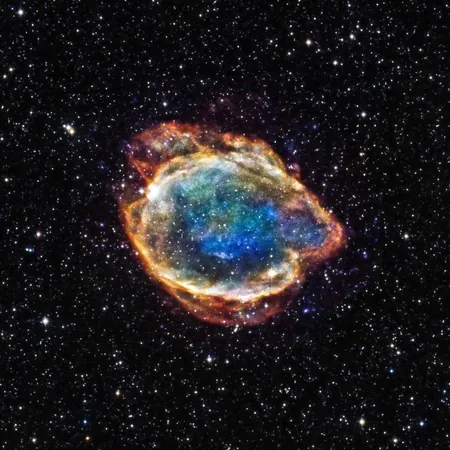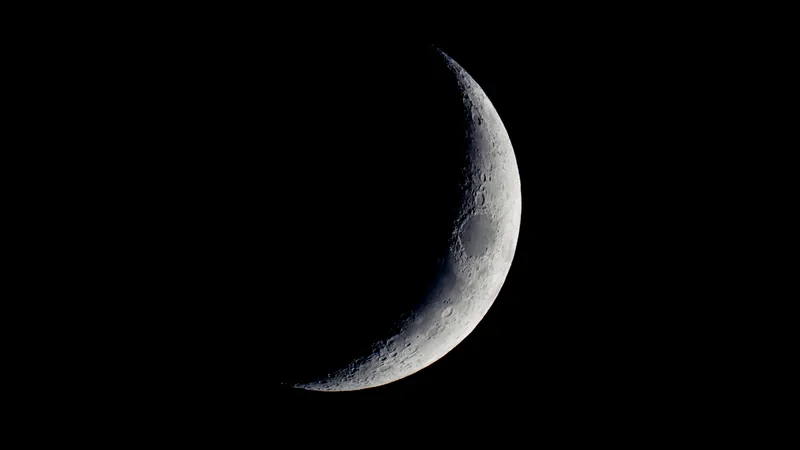
Is Dark Energy Weakening? New Supernova Findings Could Change Everything!
2025-07-25
Author: Li
Imagine a balloon inflating faster and faster, never slowing down—that's how our universe is behaving, according to findings from 1998 involving exploding stars known as supernovae. Scientists revealed that a mysterious force, dubbed "dark energy,” is responsible for this accelerated expansion.
But hold on! New analysis of over 2,000 supernovae suggests that dark energy might not be as unchanging as we previously thought. It could actually be fluctuating and perhaps weakening over time.
The Brightness of Supernovae: Nature's Measuring Stick
Type Ia supernovae are stellar fireworks resulting from a white dwarf star accumulating too much material. These cosmic explosions are so intensely bright they can be seen across billions of light-years. Their consistent brightness makes them perfect "standard candles" for gauging astronomical distances. Think of it like estimating how far away a streetlight is based on its glow—astronomers use these supernovae to calculate their distance from Earth.
A Revolutionary Dataset Unraveled
Since that groundbreaking Nobel Prize-winning discovery in 1998, astronomers have identified over 2,000 Type Ia supernovae utilizing multiple telescopes and techniques. However, a major hurdle emerged: comparing data from various sources was akin to using different measuring sticks—each brought its own calibrations and discrepancies.
To overcome this obstacle, the Supernova Cosmology Project assembled a groundbreaking dataset named "Union3," which is the largest standardized collection of supernova data ever. With a meticulous analysis of 2,087 supernovae from 24 datasets, astronomers aligned their findings, enabling a comprehensive view.
Dark Energy: The Universe’s Driving Force
Upon examining this extensive dataset, researchers found that dark energy might have varied throughout cosmic history. David Rubin, the study's lead author from the University of Hawaii, states, "Dark energy makes up almost 70% of the universe, driving its expansion. If it’s weakening, we might witness a slowdown in that expansion." This revelation could transform our understanding of the universe's fate.
What If Dark Energy Is Changing?
Traditionally, researchers utilized the Lambda CDM model, assuming that dark energy remains constant and counters gravitational forces. If dark energy is indeed weakening, it could lead to drastically different scenarios for our universe. Should dark energy triumph over gravity, the universe might expand infinitely, potentially culminating in a catastrophic "Big Rip" where even atoms could be torn apart. Conversely, if gravity prevails, expansion could decelerate, reverse, or spiral into a "Big Crunch," collapsing everything back together. A stable balance could lead to a steady state for the universe.
Compelling Evidence from Multiple Studies
What adds to the excitement is that this potential change in dark energy isn't isolated. A separate research initiative, the Dark Energy Spectroscopic Instrument (DESI), which examines galaxy clusters, has also observed similar indications that dark energy may be evolving.
While researchers are cautious, recognizing that the evidence is not yet definitive, they aim to bolster their findings by incorporating hundreds more supernovae into their dataset over the next year. Additionally, forthcoming telescopes like the Vera C. Rubin Observatory and the Nancy Grace Roman Space Telescope are expected to discover tens of thousands of new supernovae in the coming decade, promising to shed more light on this cosmic mystery.





 Brasil (PT)
Brasil (PT)
 Canada (EN)
Canada (EN)
 Chile (ES)
Chile (ES)
 Česko (CS)
Česko (CS)
 대한민국 (KO)
대한민국 (KO)
 España (ES)
España (ES)
 France (FR)
France (FR)
 Hong Kong (EN)
Hong Kong (EN)
 Italia (IT)
Italia (IT)
 日本 (JA)
日本 (JA)
 Magyarország (HU)
Magyarország (HU)
 Norge (NO)
Norge (NO)
 Polska (PL)
Polska (PL)
 Schweiz (DE)
Schweiz (DE)
 Singapore (EN)
Singapore (EN)
 Sverige (SV)
Sverige (SV)
 Suomi (FI)
Suomi (FI)
 Türkiye (TR)
Türkiye (TR)
 الإمارات العربية المتحدة (AR)
الإمارات العربية المتحدة (AR)